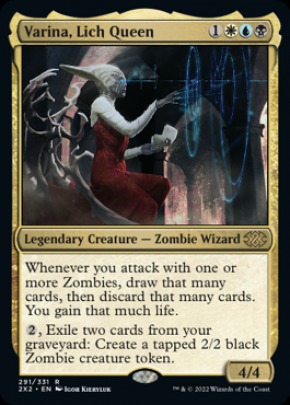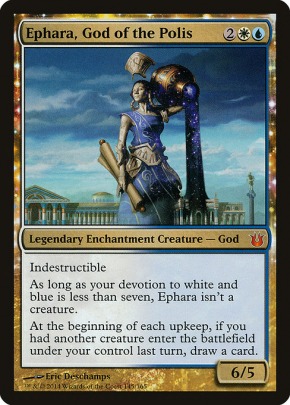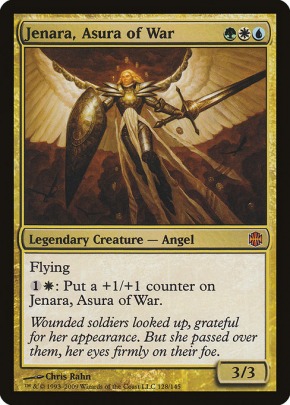"The most powerful player is the one getting killed? That's kind of nonsense, don't you think? It's not very powerful if you can't even survive. It's not that one player is far, far ahead, but if someone is making big moves, either it's because they think they can run away with it or because someone else is pulling ahead."
If they're the most powerful then they've often got 2-3 other players trying to hurt them. Sometimes that means removing their stuff to reduce their power and put someone else in the lead. Sometimes it means attacking them until they're dead, especially if you don't have removal. It happens frequently when I play Kaervek because the other players will often be targeting their face with kaervek triggers, if their life total is smaller than their board.
Could also be a combo player that people know is threatening to go off but don't have good means to interact, or don't trust that their interaction will be enough. Is the combo player in the lead if they're a turn away from their combo but can't stop lethal damage? Idk, kind of academic really. Point is, people are motivated to kill them because they're scary.
"Most decks are playing plenty of instant-speed removal to blank a threat.
I'm not sure why you believe otherwise. Nor do I understand why you think that the ability to just kill people yourself is common. Do you not play with anyone who attempts to survive? Your perspective is wild to me."
Um...obviously because in most groups I've played in, that hasn't been the case. Most decks have SOME instant-speed interaction, but usually not a lot, usually most of their cards are dedicated to increasing their own power. That's not my "perspective," that's just what other people are playing. Personally I usually dedicate quite a few slots to interaction.
If it's archenemy with one of the other 3 players having a better board than the other 2, sure it's pretty common that they could kill one of the other players, but won't because it's a bad play, or because it would leave them open to attack. Maybe that's not an every-game situation, I haven't been recording statistics or anything, but it definitely happens a decent amount of the time. Usually it goes unnoticed because everyone knows that killing the player would be a bad move while someone else is the threat. Anyway tbh it's not really important to the discussion.
No clue what "Do you not play with anyone who attempts to survive?" is supposed to mean. Obviously everyone attempts to survive. I do think most people tend to favor surviving via building the biggest board they can as quickly as they can, rather than lying low and dealing with key problems, as I usually prefer to do, but to each their own.
"It happens practically every time I play magic. I actually had a stellar game at Commandfest DC where Kozilek player was in command most of the game, but needed me not to die to keep the red player from getting back the things I'd double
Detention Sphered, the other players also needed me not to die because I had stolen the Kozilek player's Ulamog, and I needed the other players not to die because I couldn't manage a 1-on-1 at that point, and all 4 players at the table were using removal to keep that status quo from breaking against them. But these people were total strangers to me, and all 3 other players were protecting me because my death would decide the winner depending on whose turn it was when I died. It was great."
That sounds like an anomaly to me based on the games I usually play, and I have a very hard time believing people are using removal to protect each other in practically every game, but maybe you just play in very different metas than me. Who can say.
(but at least I know how detention sphere works)
"I mean you can work together toward a common cause without defining terms and drawing boundaries. Like, you're not really making temporary alliances if you're not actually allying with anyone. Contracting someone out to do something for you isn't really making allies."
Not sure why you can't be allies just because you're defining terms. At the end of the day, I (or anyone) am only interested in an "ally" so far as what that ally is going to do for me in the current game. I can just do friendly things and hope they do friendly things back with no assurances, or we can define what our temporary alliance means and both go forward feeling confident that we're getting what we want, rather than just hoping.
The way you describe this is absurd to me. You act like you're trying to make friends based on mutual trust or something. Seems weird to have suddenly switched positions and for me to be the skeptical one - I don't trust anyone unless I have a deal with them, or unless the board state very clearly dictates their targets. Otherwise if the game is fairly even, who knows what a good topdeck might change.
"I'm not saying you're the bad guy, I'm not saying everyone hates your deals. I'm saying that your deal-making is going to impact people's perspectives and decisions in negative ways you may not be noticing that can actually put you in worse situations. What I'm trying to say is probably far more offensive to you than suggesting that you're the bad guy: what I'm really suggesting is that my approach to politics is better than yours. Though I'm reasonably sure you'd say the same back at me considering how contrasting our approaches are."
Correct.
I win often enough that I have a hard time believing I'm hurting myself with my approach, though there's always room to improve. Though I suspect you may say the same, and while I have a guess at my win% I don't have any record of it, and it's impossible to tell how much of that is strategy and how much is just power level discrepancy, opponents being new, etc. So there's probably no point in turning this into a deck-measuring contest.
I haven't asked these question and I probably should have earlier:
-Meta-wise, what is your situation? Steady group since high school, public group you switch every few years, different people online every game?
-Within that meta (or those metas) what percentage of people attempt to make deals? What percentage of people outright refuse to make any deal? How often do deals actually happen?
"Than everyone at that table is bad at communication. Both the person who couldn't explain their reasoning well enough that others were uncomfortable, and the others who piled on someone for the audacity of playing slightly different. If the person has clearly indicated they're not going to make deals with you, and the whole table continues to offer them deals and then kills them first, and he leaves the table dejected before the game ends, and then they gossip about him behind his back... it's not a good look."
The guy that killed the player, killed him because the player had direct damage on the table, and the killer was at low life and the player wouldn't talk deals (as he'd refused all game). The game was pretty balanced at the time, ignoring the life totals, though the killer probably had the biggest board and would have been a reasonable target for the direct damage. Without any way to guarantee a live-and-let-live situation, and with passing the turn risking immediate death, he attacked him for lethal in order to ensure he wouldn't die (from niv mizzet triggers, if you were curious).
It's not because he "had the audacity of being different", it's because without dealing there was no way to trust him and the right move was to kill him.
He didn't leave "dejected", he left in a salty huff and was kind of a prick all game imo. Not that it was cool to talk behind his back either, but I do think it's funny that you're painting him in a positive light without actually knowing any details, just because he agrees with you about deal-making.
WizardMN wrote: ↑4 years ago
But, I thought this was an interesting comment. Not because it isn't a legitimate situation, but because you dying means the things you exiled with Sphere stay exiled. You could have died and those things would not have come back. If it was
Deputy of Detention then it would work how they thought it would; but not Detention Sphere.
And, now we continue with our regularly scheduled broadcast....

Haha, I was going to point that out too. Rules knowledge is tech.











